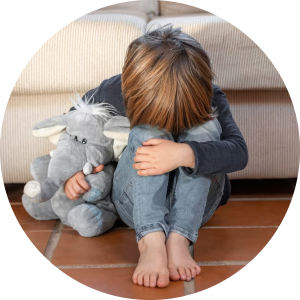Family dynamics can often be challenging. Whether you have a traditional or non-traditional family, we can help. Family counseling provides an opportunity for everyone to openly talk about their thoughts and feelings in a safe environment.
Together, we can try to solve any familial issues including parent-child conflicts, family communication problems, defiant or isolated teens, grief and issues of loss, or transitions after divorce or separation.
Conduct Disorder/
Oppositional Defiant Disorder
According to Department of Health and Human Services, Conduct Disorder is defined as “repeatedly violating the personal or property rights of others and the basic expectations of society.”
Oppositional Defiant Disorder is similar to Conduct Disorder but it is distinguished by its definition as a “recurrent pattern of negativistic, defiant, disobedient and hostile behavior towards authority figures…” It states, “
Oppositional Defiant Disorder may start as early as the preschool years, while Conduct Disorder generally appears when children are older.” Individuals suffering from this disorder show symptoms of aggression or threat towards others, criminal activities such as lying or stealing, serious school violations, substance abuse, and premature sexual activities.
AGGRESSION
According to Merriam-Webster, Aggression can be defined as “angry, or violent behavior or feelings.” There are broad categories of aggression. These include hostile, affective, or retaliatory aggression and instrumental, predatory, or goal-oriented aggression. Some research indicates that people with tendencies toward “affective” aggression, defined in this study as being “impulsive, unplanned, overt, or uncontrolled” have lower IQ’s than those with tendencies toward “predatory” aggression, defined here as being “goal-oriented, planned, hidden, or controlled”. (Berg, Liz “Comparing Predatory Versus Affective Violence and Examining Early Life Stress as a Risk Factor” Sound Ideas Spring 2014. University of Puget Sound.)
ANXIETY AND STRESS
Stress and anxiety are related, but are often confused. Stress is tension associated with a specific event (e.g. a test or a job), while anxiety is a non-specific worry about the future. To find relief, people with anxiety may turn to repetitive routines, preoccupations, or addictions
SELF-ESTEEM
Self-esteem is a feeling of personal worth. It is important to be able to value yourself regardless of your current state of personal achievement, beauty, or intelligence. Your self-esteem creates the foundation for a full life, great relationships, and a feeling of well-being.
ARGUMENTS
Conflict resolution is an important part of any relationship. Conflict plays a vital role in allowing two people to reconcile differing needs. Unfortunately, when conflict is handled poorly, it can cause distress in the relationship.
COMMUNICATION
Feeling understood and understanding one’s partner is what allows couples to deeply share one another’s lives. Often, couples struggle with communication issues, which actually mask deeper relationship issues
TRUST
Trust plays a vital role in sustaining a relationship. People trust differently. For some, trust is established quickly, while others are slow to grant trust. Similarly, some are able to forgive quickly, while others find it hard.
TRAUMA
Experiences that overwhelm or scare us can leave a lasting impression. The symptoms can leave us stressed, depressed, and have negative consequences for our work and home life.
DEPRESSION
People who struggle with depression often feel down for extended periods. They lose interest in activities that they once found pleasurable. Depression negatively affects millions of Americans each year.









